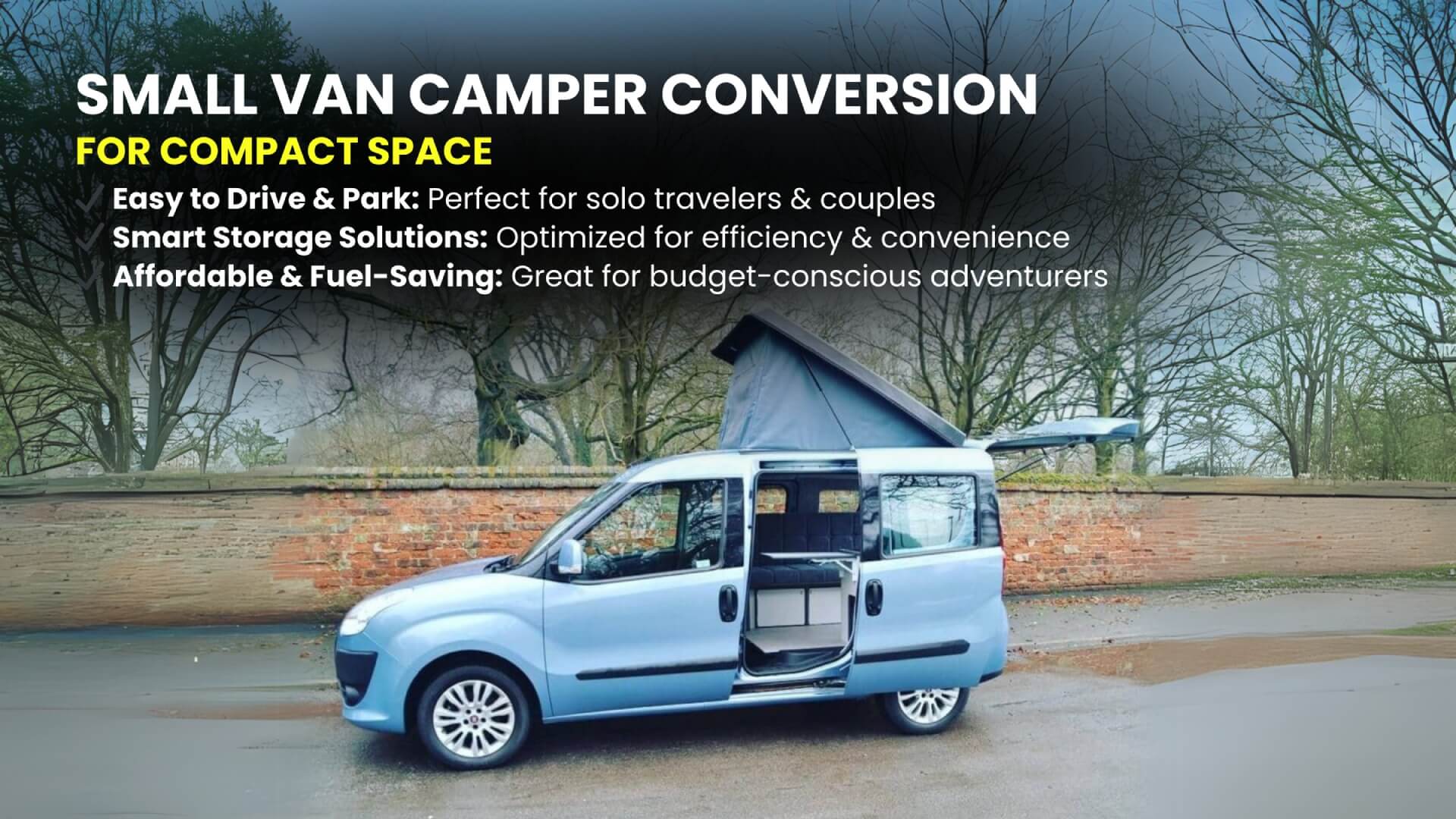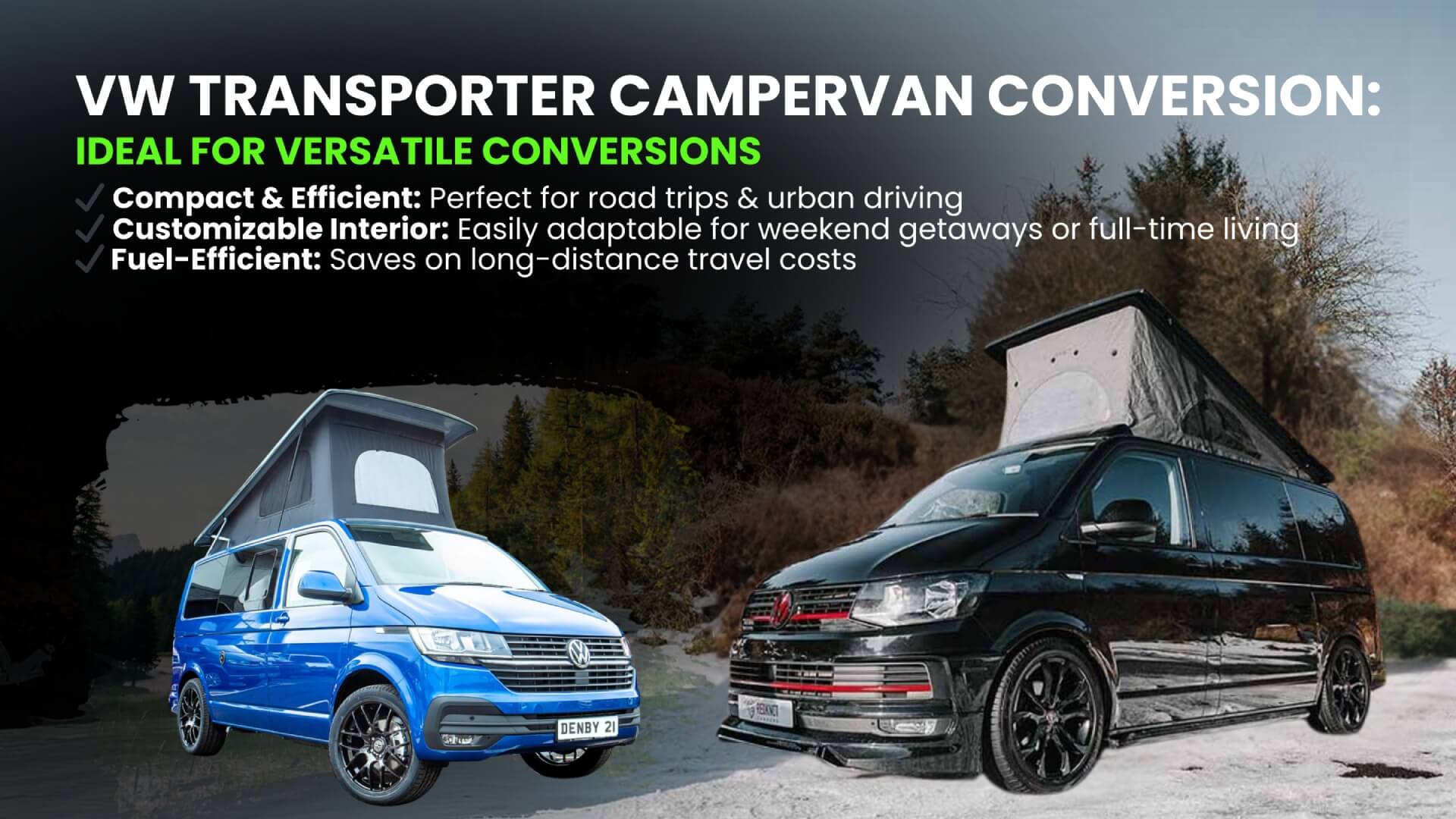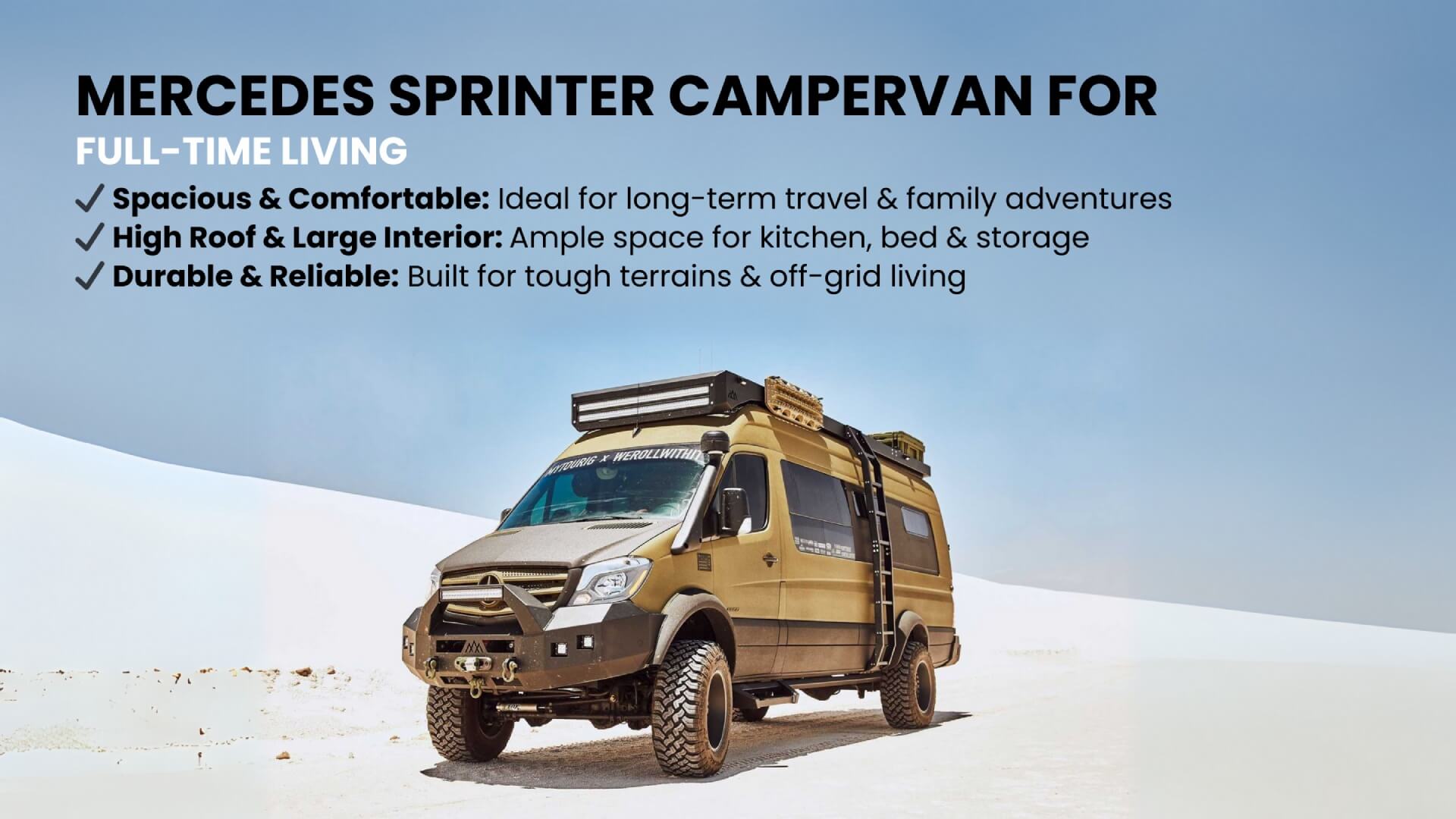Blog
Best Vans for Camper Conversion: Top Choices for Full-Time Living and Weekend Getaways
When it comes to camper van conversions, choosing the right van is essential for ensuring comfort, practicality, and ease of modification. The best vans offer a combination of ample space, fuel efficiency, and a solid build, making them ideal for both full-time living and occasional weekend getaways.
In this guide, we explore the top van options, highlighting their suitability for conversion, the ease of installation, and how well they optimise space for your travel needs.
Why Convert a Van into a Camper?

Converting a van into a camper offers several compelling benefits when compared to purchasing a pre-built motorhome.
Cost-Effectiveness
Converting a van is generally far more affordable than buying a pre-built motorhome. Whether you do the work yourself or choose a professional conversion, it allows you to stick to your budget.=
Moreover, unlike motorhomes, which often depreciate rapidly, a well-maintained van conversion can retain its value longer and might even be considered an investment.
Tailored to Your Needs
One of the main advantages of converting a van is the ability to personalise every aspect of the build. You have full control over the layout, materials, and features, allowing you to create a space that perfectly suits your specific needs.
From the kitchen design to the sleeping arrangements, a van conversion is truly customisable. Additionally, the flexibility to start with a basic conversion and add upgrades over time makes it easier to build the van of your dreams at your own pace.
Better Maneuverability and Efficiency
A converted van is more compact and easier to drive compared to a large motorhome, making it ideal for navigating narrow streets, tight parking spaces, and remote locations.
Vans are also typically more fuel-efficient, which translates to lower running costs on long trips. This makes them a more practical option for frequent travellers or those who want to save on fuel over time.
Sustainability and Self-Sufficiency
Van conversions allow for eco-friendly modifications, such as solar panels, energy-efficient appliances, and water-saving systems, making them ideal for sustainable, off-grid living. These systems are often difficult to incorporate into a pre-built motor home.
With the right setup, a van can become a fully self-sufficient vehicle, perfect for those looking to live off the grid or enjoy nature without relying on campsites or hookups.
Types of Vans Suitable for Camper Conversion
When selecting a van for conversion, it’s essential to choose the right size and features based on your needs. Here’s a breakdown of the Types of Commercial Vehicles and some popular models, each suitable for different kinds of conversions.
Small Vans for Conversion: VW Caddy, Citroen Berlingo
Small vans like the VW Caddy and Citroen Berlingo are ideal for solo travellers or those looking for a compact weekend camper. Their small size makes them easy to drive and park, perfect for city living and short trips. Despite their compact nature, they can be creatively converted to include a small bed, basic kitchen, and essential storage, making them an excellent choice for minimalist camping and short stays.
Medium Vans: Renault Trafic, VW Transporter
Medium-sized vans, such as the Renault Trafic and VW Transporter, offer a great balance between space and drivability. They provide enough room for more comfortable setups, such as a full kitchen, seating area, and even a fixed bed.
These vans are ideal for those looking for a versatile option that can handle both extended road trips and everyday use. Their manageable size also ensures they remain easy to drive while offering ample space for conversion.
Large Vans: Mercedes Sprinter, Fiat Ducato
Large vans like the Mercedes Sprinter and Fiat Ducato are perfect for full-time living and long-term travel. Their spacious interiors allow for the installation of full kitchens, bathrooms, and dedicated sleeping areas, making them well-suited for those who want a home on wheels.
While larger in size, they provide the comfort and amenities required for living on the road and are the go-to choice for full-time van lifers and families.
Electric Vans: Nissan e-NV200, Mercedes EQV
Electric vans such as the Nissan e-NV200 and Mercedes EQV are becoming increasingly popular, especially among eco-conscious travellers. These vans offer an eco-friendly alternative for urban campers or short trips, with lower running costs and fewer emissions.
While their range may be more limited compared to traditional vans, they’re perfect for city-based adventures or short-distance travel, and with advancements in charging infrastructure, they are becoming a more viable option for van conversions.
Key Attributes to Consider for Camper Van Conversions
When converting a van into a camper, several key attributes should be considered to ensure your van suits your travel needs and lifestyle. From the van’s size to its fuel efficiency, each factor plays a critical role in the success and comfort of your conversion.
Size and Layout Flexibility
The size of the van directly impacts the layout and how much space you have to work with. Larger vans offer more flexibility, allowing for the installation of a full kitchen, bathroom, and larger sleeping arrangements.
Smaller vans, on the other hand, require more creative use of space, but still offer a cosy setup for solo travellers or short trips. Think about what features are essential—such as bed placement, kitchen area, or storage—and how much room each will require. Compact layouts work well in smaller vans, while more expansive designs are better suited to larger vehicles.
Fuel Efficiency and Running Costs
Fuel efficiency is a major consideration when choosing a van, as it affects both your travel costs and environmental impact. Diesel vans are generally more fuel-efficient for long-distance travel, particularly on highways, but they may have higher emissions. Petrol vans are often cheaper to maintain and are ideal for urban driving, but they tend to have slightly lower fuel efficiency than diesel.
In contrast, electric vans like the Nissan e-NV200 offer the lowest running costs in terms of fuel, especially for shorter journeys. Although the upfront cost of an electric van may be higher, their lower maintenance costs and absence of fuel expenses make them an attractive option for those planning frequent city trips or shorter adventures.
Roof Height and Standing Room
The roof height is another essential factor for comfort, particularly if you plan to live in the van full-time or take long trips. Standard roof heights may not provide enough space for you to stand upright, which can lead to discomfort and limit your movement.
High-roof vans, such as the Mercedes Sprinter, allow for full standing height, making it much easier to move around, cook, and sleep comfortably. For extended trips or full-time van life, a high roof is essential for comfort and usability, as it gives you the freedom to live more naturally inside your mobile home.
Payload and Weight Capacity
The payload capacity of your van determines how much weight it can carry, including the additional equipment you may install during the conversion, such as solar panels, water tanks, or heavy furnishings. It’s important to choose a van with enough payload capacity to handle these additions without exceeding the van’s weight limits.
Overloading your van can reduce fuel efficiency, increase wear and tear, and even affect handling. Always check the van’s maximum weight capacity and consider the weight of your conversion materials before making a purchase to ensure your van remains within safe operating limits.
Best Vans for Different Lifestyles
When choosing a van for conversion, it’s important to consider the lifestyle and travel needs of the people who will be using it. Whether you’re a solo traveller, a family, or an off-grid adventurer, there are specific vans that suit each type of journey. Here’s a breakdown of the best vans for different lifestyles.
Best Vans for Solo Travelers and Couples
For solo travellers or couples, small vans are ideal as they are easy to drive, park, and manage while still providing enough space for a compact, minimalist setup. Vans like the VW Caddy or Citroen Berlingo can be transformed into cosy campers with a basic bed setup, a compact kitchen, and storage for essentials.
These smaller vans are perfect for weekend getaways or short trips where space efficiency and ease of use are key. Their manageable size also means that you can easily navigate narrow streets and park in urban areas, making them great for both city and countryside exploration.
Best Vans for Families
For families or groups travelling long-term, larger vans provide the necessary space for comfort, storage, and essential amenities. Mercedes Sprinter and Fiat Ducato are popular choices for family conversions. These vans offer ample room for full kitchens, bathrooms, and multiple sleeping areas, making them suitable for extended trips or full-time van life.
You can set up separate zones for sleeping, cooking, and relaxing, creating a functional space for everyone. These larger vans provide stability and room to breathe, ensuring that families can travel comfortably while maintaining their home-away-from-home setup.
Best Vans for Off-Grid Adventures
For those who seek adventure off the beaten path, rugged vans with the ability to handle rough terrain and carry outdoor gear are essential. The Iveco Daily stands out as a fantastic option for off-grid adventurers. With its high payload capacity and strong off-road capabilities, the Iveco Daily can carry bulky outdoor equipment like bicycles, kayaks, or camping gear, making it ideal for long trips to remote areas.
Additionally, its durability and rugged build allow it to withstand tough conditions, while offering ample space for off-grid power systems like solar panels, water tanks, and camping gear storage. This van is built for those who like to take the road less travelled and need a van that can keep up with demanding adventures.
Comparison of Popular Camper Conversion Vans
When choosing a van for camper conversion, it’s important to weigh the pros and cons of each model to find the best fit for your needs. Here’s a comparison of some of the most popular camper conversion vans: the VW Transporter, Mercedes Sprinter, and Ford Transit. Each has its own strengths and potential drawbacks, depending on your specific requirements.
VW Transporter
Pros
- Compact Size: The VW Transporter is known for its manageable size, making it ideal for urban and rural driving. It’s easy to park and manoeuvre, even in tighter spaces.
- Fuel Efficiency: Generally more fuel-efficient than larger vans, making it a cost-effective option for long-distance travel.
- Classic Conversion Base: The VW Transporter has been a popular choice for conversions for decades, with a wealth of conversion kits and expert advice available.
- Good Resale Value: VW Transporters hold their value well, so you can expect a good return if you decide to sell.
Cons
- Limited Space: While great for solo travellers or couples, the VW Transporter can feel cramped for families or those seeking more storage space.
- Ride Quality: Some owners report that the ride can be a bit rough, especially on longer trips or uneven terrain.
Mercedes Sprinter
Pros
- Spacious Interior: The Mercedes Sprinter offers ample room for conversions, making it a favourite for families and full-time van lifers. It’s spacious enough to include a fully equipped kitchen, bathroom, and multiple sleeping areas.
- High Roof Options: Available in high-roof variants, the Sprinter allows for comfortable standing room, which is essential for full-time living.
- Reliable Performance: Mercedes-Benz is known for its durability and performance, making the Sprinter a solid choice for long-term travel.
- Versatility: It comes in multiple lengths and heights, giving you flexibility in your conversion plans.
Cons
- Higher Purchase Price: The Sprinter tends to be more expensive than other vans, which could be a significant upfront cost.
- Fuel Costs: Diesel models may not be as fuel-efficient as smaller vans, leading to higher running costs.
- Size: The larger size can make parking and manoeuvring more difficult, especially in urban areas.
Ford Transit
Pros
- Affordable Pricing: The Ford Transit is often more affordable than both the VW Transporter and Mercedes Sprinter, making it a budget-friendly option for camper conversions.
- Variety of Sizes: It comes in a wide range of sizes, from low roof to high roof, and short to long wheelbases, allowing for more flexibility depending on your needs.
- Strong Payload Capacity: The Ford Transit offers an impressive payload capacity, making it ideal for carrying heavy conversion materials or equipment like solar panels.
- Comfortable Ride: The Ford Transit provides a smoother ride compared to some other vans, which is especially beneficial for longer trips.
Cons
- Fuel Economy: The Ford Transit, especially in larger configurations, may not be as fuel-efficient as smaller vans.
- Size Issues: Larger versions can be difficult to park and manoeuvre in tight spaces, especially in busy urban areas.
- Build Quality: Some owners report that the build quality may not be as premium as the Mercedes Sprinter, though it’s still highly durable.
Comparison Table of Popular Camper Conversion Vans
| Van Model | Pros | Cons |
|---|---|---|
| VW Transporter | Compact size, fuel-efficient, good resale value, ideal for solo travel or couples | Limited space, rough ride, cramped for long-term living |
| Mercedes Sprinter | Spacious, high-roof options, reliable performance, versatile | Higher purchase cost, higher fuel costs, difficult to park in urban areas |
| Ford Transit | Affordable, wide range of sizes, strong payload capacity, comfortable ride | Larger models less fuel-efficient, challenging to park, build quality may be lower |
How Much Does It Cost to Convert a Van?
The cost of converting a van depends on several factors, including the base van price, conversion materials, and labour. Base van prices can range from £5,000 for smaller used models to £30,000 for new, larger vans.
Conversion costs vary depending on the level of finish, with basic conversions starting around £2,000 and high-end custom setups reaching £20,000 or more. Labour costs for professional conversions typically range from £5,000 to £20,000, depending on the complexity of the build.
For more detailed budget planning, check out Vanify’s conversion products and budget guides to help optimise your costs and ensure you get the most value.
FAQs on Camper Van Conversions
What is the most reliable van for camper conversion?
The Mercedes Sprinter and VW Transporter are highly reliable, offering long lifespans and easy maintenance. Both are great for full-time van life or long-term travel. Read out complete Van Buying Guide for a full range of LG vehicles.
What is the best small van for camper conversion?
The Citroen Berlingo and VW Caddy are excellent small vans for conversions, offering space-efficient layouts and easy manoeuvrability for solo travellers or weekend trips.
What features should I prioritise in a camper van conversion?
Focus on foldable beds, solar power, a compact kitchen, and good insulation for comfort, energy efficiency, and space-saving.







